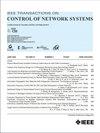无向符号网络上具有代理间约束的机器人机械手鲁棒编队控制
IF 5
3区 计算机科学
Q2 AUTOMATION & CONTROL SYSTEMS
引用次数: 0
摘要
在这篇文章中,我们讨论了在末端执行器坐标下协作和竞争机器人操纵臂网络的分布式控制问题。提出了一种保证末端执行器避免碰撞的分布式二部队形控制器。在被考虑的环境中,形成两个群体,并达成群体间的共识或分歧。另一方面,末端执行器实现了群内形成。为了保证末端执行器不发生碰撞,我们使用barrier-Lyapunov函数设计了基于梯度的控制律。此外,该控制器还保证了闭环系统对外部干扰的鲁棒性。后者被认为是由外系统产生的,因此它们被基于内部模型的补偿器有效地拒绝。更准确地说,我们建立了二部形成流形的渐近稳定性。最后,通过数值模拟对理论结果进行了验证。本文章由计算机程序翻译,如有差异,请以英文原文为准。
Robust Formation Control of Robot Manipulators With Interagent Constraints Over Undirected Signed Networks
In this article, we address the problem of distributed control of a network of cooperative and competitive robot manipulators in end-effector coordinates. We propose a distributed bipartite formation controller that guarantees collision avoidance of the end-effectors. In the considered setting, two groups are formed and reach intergroup bipartite consensus or disagreement. On the other hand, the end-effectors achieve intragroup formation. To ensure that the end-effectors do not collide, we design gradient-based control laws using barrier-Lyapunov functions. In addition, the proposed controller ensures that the closed-loop system is robust to external disturbances. The latter are assumed to be generated by an exosystem, so they are effectively rejected by an internal-model-based compensator. More precisely, we establish the asymptotic stability of the bipartite formation manifold. Finally, we illustrate our theoretical results via numerical simulations.
求助全文
通过发布文献求助,成功后即可免费获取论文全文。
去求助
来源期刊

IEEE Transactions on Control of Network Systems
Mathematics-Control and Optimization
CiteScore
7.80
自引率
7.10%
发文量
169
期刊介绍:
The IEEE Transactions on Control of Network Systems is committed to the timely publication of high-impact papers at the intersection of control systems and network science. In particular, the journal addresses research on the analysis, design and implementation of networked control systems, as well as control over networks. Relevant work includes the full spectrum from basic research on control systems to the design of engineering solutions for automatic control of, and over, networks. The topics covered by this journal include: Coordinated control and estimation over networks, Control and computation over sensor networks, Control under communication constraints, Control and performance analysis issues that arise in the dynamics of networks used in application areas such as communications, computers, transportation, manufacturing, Web ranking and aggregation, social networks, biology, power systems, economics, Synchronization of activities across a controlled network, Stability analysis of controlled networks, Analysis of networks as hybrid dynamical systems.
 求助内容:
求助内容: 应助结果提醒方式:
应助结果提醒方式:


